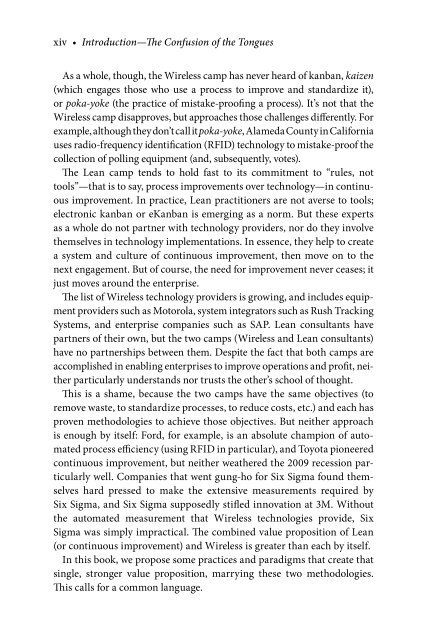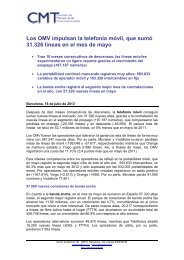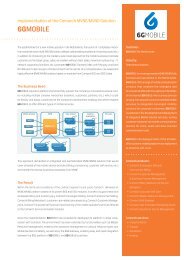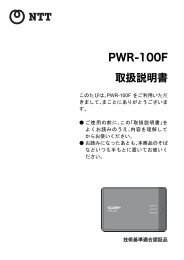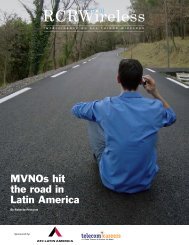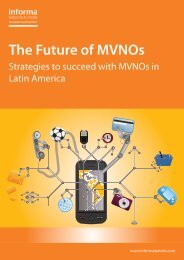Thin Air: How Wireless Technology Supports Lean ... - Prepaid MVNO
Thin Air: How Wireless Technology Supports Lean ... - Prepaid MVNO
Thin Air: How Wireless Technology Supports Lean ... - Prepaid MVNO
Create successful ePaper yourself
Turn your PDF publications into a flip-book with our unique Google optimized e-Paper software.
xiv • Introduction—The Confusion of the Tongues<br />
As a whole, though, the <strong>Wireless</strong> camp has never heard of kanban, Âkaizen<br />
(which engages those who use a process to improve and standardize it),<br />
or poka-yoke (the practice of mistake-proofing a process). It’s not that the<br />
<strong>Wireless</strong> camp disapproves, but approaches those challenges differently. For<br />
example, although they don’t call it poka-yoke, Alameda County in California<br />
uses radio-frequency identification (RFID) technology to Âmistake-proof the<br />
collection of polling equipment (and, subsequently, votes).<br />
The <strong>Lean</strong> camp tends to hold fast to its commitment to “rules, not<br />
tools”—that is to say, process improvements over technology—in continuous<br />
improvement. In practice, <strong>Lean</strong> practitioners are not averse to tools;<br />
electronic kanban or eKanban is emerging as a norm. But these experts<br />
as a whole do not partner with technology providers, nor do they involve<br />
themselves in technology implementations. In essence, they help to create<br />
a system and culture of continuous improvement, then move on to the<br />
next engagement. But of course, the need for improvement never ceases; it<br />
just moves around the enterprise.<br />
The list of <strong>Wireless</strong> technology providers is growing, and includes equipment<br />
providers such as Motorola, system integrators such as Rush Tracking<br />
Systems, and enterprise companies such as SAP. <strong>Lean</strong> consultants have<br />
partners of their own, but the two camps (<strong>Wireless</strong> and <strong>Lean</strong> consultants)<br />
have no partnerships between them. Despite the fact that both camps are<br />
accomplished in enabling enterprises to improve operations and profit, neither<br />
particularly understands nor trusts the other’s school of thought.<br />
This is a shame, because the two camps have the same objectives (to<br />
remove waste, to standardize processes, to reduce costs, etc.) and each has<br />
proven methodologies to achieve those objectives. But neither approach<br />
is enough by itself: Ford, for example, is an absolute champion of automated<br />
process efficiency (using RFID in particular), and Toyota pioneered<br />
Âcontinuous improvement, but neither weathered the 2009 recession particularly<br />
well. Companies that went gung-ho for Six Sigma found themselves<br />
hard pressed to make the extensive measurements required by<br />
Six Sigma, and Six Sigma supposedly stifled innovation at 3M. Without<br />
the automated measurement that <strong>Wireless</strong> technologies provide, Six<br />
Sigma was simply impractical. The combined value proposition of <strong>Lean</strong><br />
(or continuous improvement) and <strong>Wireless</strong> is greater than each by itself.<br />
In this book, we propose some practices and paradigms that create that<br />
single, stronger value proposition, marrying these two methodologies.<br />
This calls for a common language.


